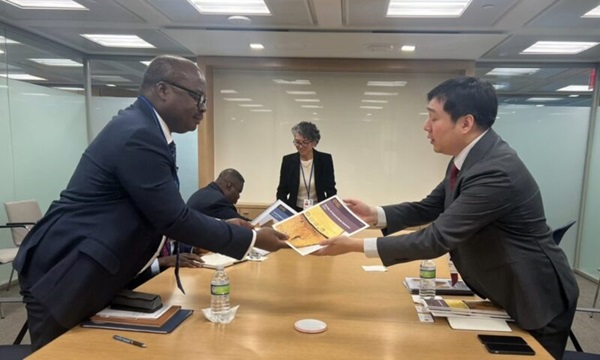Dr Ernest Addison, the Governor of the Bank of Ghana (BoG), has held bilateral engagements with two important development partners on the country’s economic recovery and stability.
The Central Bank Governor engaged representatives from the European Bank for Reconstruction and Development and the World Gold Council, on Tuesday, October 22.
This was on the sidelines of the 2024 Annual Meetings of the International Monetary Fund (IMF) and the World Bank Group (WBG), in Washington, DC (USA).
The Central Bank Governor and his team held closed door discussions with Dr Heike Harmgart, Managing Director, Sub-Saharan Africa, EU Bank for Reconstruction and Development.
Present at the meeting were, Burkard Kubel-Sorger, Chief Finance Officer (CFO)/Vice President and Artur Radziwill, Director, Country Economics, Strategy and Policy, both of the EU Bank for Reconstruction and Development.
The Governor also had a meeting with the World Gold Council, involving Kurtulus Taskale Diamondopoulos, Director, Central Banks and Public Policy, and Shaokai Fan, Head of Asia-Pacific and Global Head of Central Banks.
Dr Harmgart of the EU Bank for Reconstruction and Development noted that the engagement with the Central Bank was borne out of their interest in the operations of BoG.
It was to enable the team to have a better appreciation of the important role of the Bank of Ghana in the country’s macroeconomic management, particularly monetary policy.
He lauded Ghana for the successful completion of its debt restructuring as part of the ongoing US$3 billion Extended Credit Facility (ECF) programme with the IMF, describing the development as a learning curve for other countries.
The Governor spoke about the sacrifices of Ghanaians in helping the government navigate the hard times in securing the IMF loan and completing the debt restructuring programme.
That, he said had been pivotal in the recent economic recovery from the crisis since the onset of the COVID-19 pandemic to the current stability.
The meeting with the World Gold Council, a non-governmental organisation (NGO) committed to enhancing supply-chain transparency in the global gold market, centred on standardisation.
Kurtulus Taskale Diamondopoulos explained the work of the Council, including the provision of standards, shaping policy and setting the principles for a perpetual and sustainable gold market.
On his part, Dr Addison, called for a working relationship that would propel certification of refinery in Ghana to further improve the gold value chain.
Ghana, Africa’s largest gold producer and the sixth in the world, mined 4.03 ounces of the global commodity in 2023, which over the past 12 months saw a price surge from US$1,947 to US$2,715.
Like seen recently in Ghana, gold is used as a store of value to hedge against inflation and currency fluctuations, serves as a Central Bank reserve, and also used a popular choice for jewellery, coins and other ornaments.
GNA





